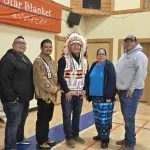
Indigenous Filmmakers Making History with Virtual Production
In late August, the Emily Carr University of Art and Design in Vancouver hosted the world’s first Indigenous-led IM4 Virtual Production Storytelling Micro-Credential, co-hosted by the IM4 Media Lab and Screen Industry Training Hub.
Indigenous filmmakers from across Canada worked in cohorts to create short film animations through two modules.
The first module focused on learning the technology workflow of virtual production and working with Unreal Engine to create short films in eight weeks.
The IM4 Creative Director, Loretta Todd, is a filmmaker from the White Fish Lake First Nation and the Red River Metis.
She said there is a need for virtual production training specifically for Indigenous people.
“Our people are so creative, innovative, and versatile,” said Todd. “I wanted to make sure our people were right there at the beginning of this virtual production technology, and that we have the same opportunities as everybody else.”
The skills acquired through this training could assist Indigenous filmmakers in securing jobs within the industry and bring those skills back to their own communities.
The curriculum consisted of 115 hours of learning.
In the second module, students attended an in-person training session at Emily Carr University in BC, where they had the opportunity to direct a short film using all the necessary equipment and an LED wall.
IM4 Project Lead Shenaz Baksh, was amazed by how fast the Indigenous creators developed their short films and their dedication to the program.
“It is important to bring access to Indigenous creators and people who don’t have the technology in their own communities,” she said. “Our Indigenous creators have really embraced this challenge and created something meaningful to put on their portfolios.”
Baksh has been working to get the project off the ground since January and was so happy to see everything come to fruition.

Photo supplied by Bee Bird
“It was such an emotional day when you see the result of everybody’s hard work,” she said. “I was sitting in during the development and feedback process of mentors during the production phases but I waited till the screening to watch everybody’s short films projects and I was so blown away by all of the cohort’s work and what they’ve created in such a short period of time”.
The screening of the short film animations took place at the end of the second in-person module.
The short films will also be screened at this year’s Vancouver International FIlm Festival taking place later this month.
The practical hands-on training will not only allow Indigenous creators to take their careers to the next level but also potentially help them become trainers in the rapidly changing virtual production industry, which is revolutionizing film production.
The processes of motion capture, meta-humans, and virtual reality are just the beginning of the new technologies on the rise.
Todd said Indigenous communities hold the true stories, which are passed down from generation-to-generation.
“Every indigenous community should have the means to produce their own work and produce their own stories because we are the ones who lived it and we are the ones who inherited these stories from our ancestors,” she said.
Filmmakers who completed the program have the knowledge which they can take back to their communities.
Ideally, they will now be able to contribute to the growth of the industry and promote Indigenous representation in film.

